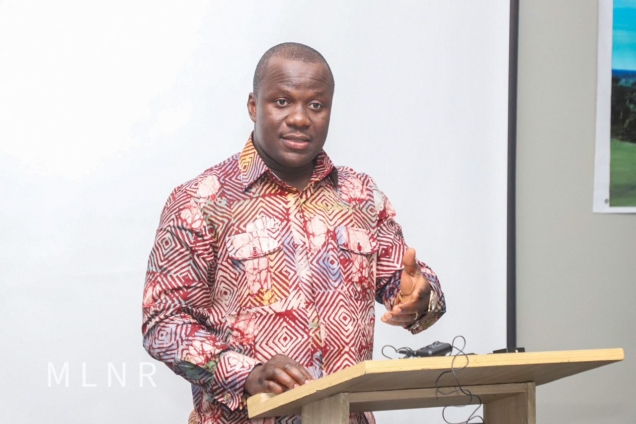Minister for Lands and Natural Resources, Samuel Jinapor, has said that the West African Sub-region annually loses US$26 billion to illicit trade in marine, including illegal fishing.
“On the economic front, Interpol estimates that 38 percent of global criminal proceeds are derived from nature crimes,” he said.
Mr Jinapor was addressing selected media personnel at the nature crimes in Ghana workshop, organised by the US Agency For Global Media- USAGM, held in Accra.
He said crimes against nature were diverse, and cut across various sectors of the economy, including land, forestry, mining, environment, fisheries, maritime, and waste management.
“Crimes such as illegal fishing, illegal mining, illegal logging, illegal overland export, under-declaration of products, mislabeling of products, poaching, wildlife trafficking, illicit wildlife trading, and land degradation, continue to threaten our environment, biodiversity, and the lives and livelihoods of millions of people across the world, while robbing us of the resources needed for development,” the Minister said.
He said these crimes had damaged some vital and vulnerable ecosystems in the world, such as forests, wildlife, oceans, wetlands, coral reefs, and mangroves.
The Intergovernmental Science-Policy Platform on Biodiversity and Ecosystem Services (IPBES) reports that globally, nature is declining at rates unprecedented in human history, and species’ extinction is accelerating at an alarming rate, he quoted.
IPBES, he said estimated that around one million animal and plant species were now threatened with extinction within the next decades, adding that these crimes, also, affected global efforts at halting climate change.
The Minister cited a report jointly produced by the World Wildlife Fund (WFF) and the United Nations Office on Drugs and Crime (UNDOC), that nature crimes accounted for about 26 percent of global emissions and remained a major stumbling block to attaining the 1.5 degrees Celsius target.
He said government had adopted a comprehensive and coordinated approach to deal with crimes associated with logging, mining, wildlife and land conversion.
They include law enforcement measures, policy, legislative, regulatory and operational reforms, stakeholder engagements as well as the use of technology to prevent, detect, investigate, prosecute, and punish these crimes.
While working to prevent these crimes, we continue to implement our aggressive afforestation and reforestation programme, including the flagship Green Ghana Project, to restore what has already been lost and mitigate the impacts of climate change, he said.
On the other hand, he said those whom nature crimes were perceived as a means of survival, government had introduced a Community Mining Scheme, for instance, to help them engage in lawful, sustainable, responsible and environmentally-sound mining practices as well as introduced a National Alternative Employment and Livelihood Programme (NAELP) to provide other sources of livelihood for these people.
He said measures would not yield the needed results without the collaboration of other stakeholders, especially the media with their power to engage and inform.
Mr Kyei Kwadwo Yamoah, a resource person in the Fisheries Sector, said Illegal Unreported and Unregulated (IUU) fishing had been identified globally as a major threat to the sustainability of the fisheries resource.
“Globally it is estimated that IUU fishing is worth over 10 billion dollars and African countries of the Gulf of Guinea with little or no capacity to monitor their fisheries are the main victims of the practice,” he said.
Mr Yamoah said most of IUU fishing practices had gained strong roots among the fishers because of a long absence of effective and sustainable enforcement actions as there is weak enforcement of the fisheries laws and regulations due to inadequate resources (both human and financial) and inadequate conflict resolution mechanisms.
Mr Kevin J. Brosnahan, Press Attaché, US Embassy in Ghana, Public Affairs Section, encouraged media practitioners to help the public understand nature crime, not just being whistle blowers but reporters of good and positive news.
He said the US Government was committed to the fight against nature crime and advised that Ghana should protect its natural resources in order not to cause severe damage to the ecosystem.
Joan Mower, Director of Development and Training-USAGM, Mr Todd Brown, Trainer of Photography and TVnews production, Voice of America, Madam Ann Mikia, Senior Media Trainer, took journalists through practical steps of creating a digital story, solution journalism, among others. Participants aside from that had field trip to the Ghana Ports and Harbour, Tema Fishing Harbour as part of the workshop.
Latest Stories
-
KPMG’s report on GRA and SML deal, government white paper on report and matters arising
5 mins -
I won’t reply to Chris Brown tour criticism – Ayra Star
8 mins -
British Columbia to back off drug decriminalisation project
16 mins -
Veteran commentator Joe Lartey Sr dies at 96
17 mins -
Livestream: Newsfile discusses KPMG report on SML deal, ILO on SSNIT reserves and NDC’s running mate
50 mins -
Ghanaian activist hugs over 1,100 trees in an hour to set Guinness World Records
51 mins -
Mathew Anim Cudjoe’s Dundee United promoted to Scottish Premiership after Championship win
53 mins -
NSMQ star Jochebed Adwoa Sutherland sweeps 12 awards at UG Vice-Chancellor’s Ceremony
2 hours -
Ghana’s Education Quality ranked 125 out of 183 countries in latest Global Youth Development Index
2 hours -
Emma Stone wants people to use her real first name
2 hours -
FIFA Club World Cup 2025: Sundowns, Esperance join Al Ahly and Wydad as CAF representatives
6 hours -
CAFCL: Al Ahly set up historic final with ES Tunis
6 hours -
We didn’t sneak out 10 BVDs; they were auctioned as obsolete equipment – EC
10 hours -
King Charles to resume public duties after progress in cancer treatment
11 hours -
Arda Guler scores on first start in La Liga as Madrid beat Real Sociedad
11 hours

